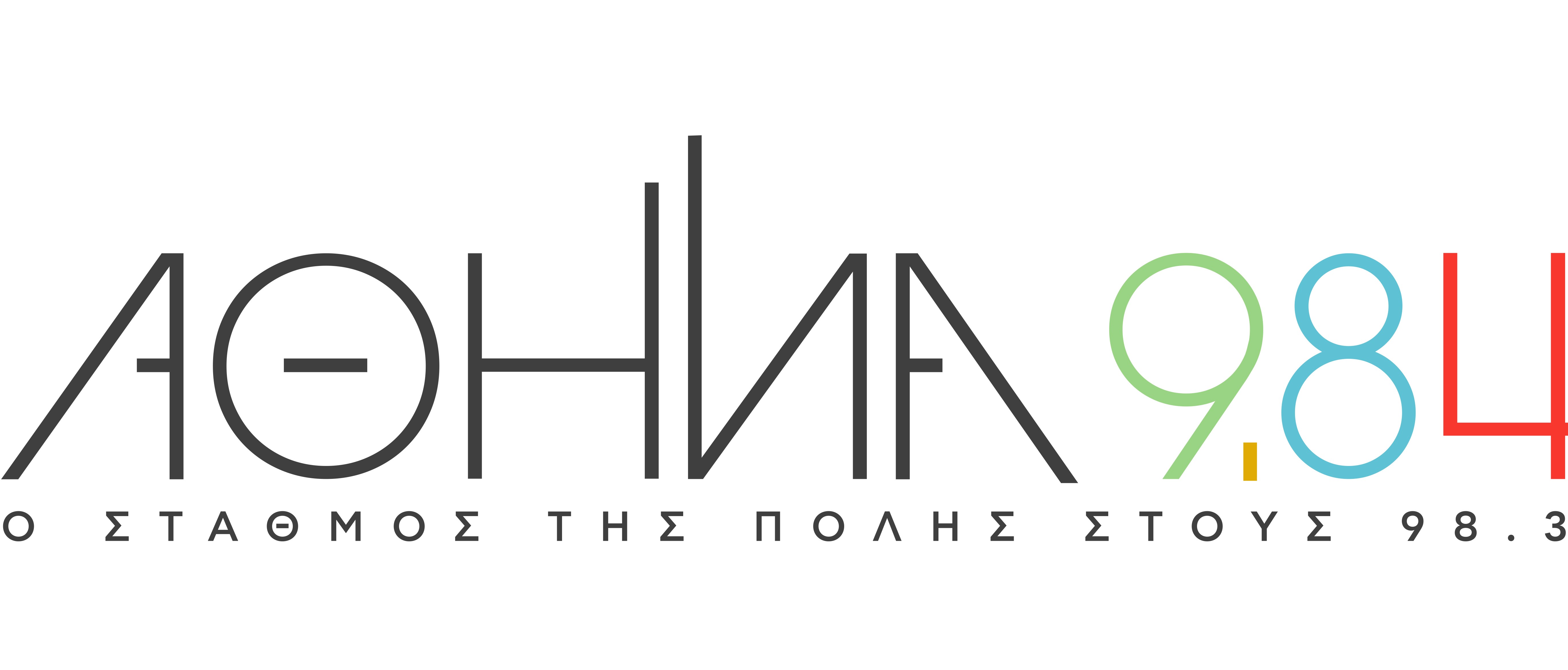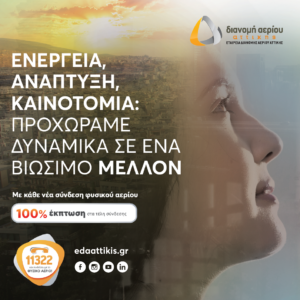Την περασμένη άνοιξη, από τις αρχές της πανδημίας του νέου κορονοϊού, η διαΝΕΟσις ξεκίνησε μια προσπάθεια καταγραφής των αντιλήψεων και των απόψεων των Ελλήνων κατά τη διάρκεια του πρωτοφανούς φαινομένου και της μεγαλύτερης κρίσης στην πρόσφατη ιστορία της χώρας μας, δημοσιεύοντας μια σειρά από έρευνες κοινής γνώμης.
Τον Απρίλιο του 2020 κατέγραψε το πώς ζουν οι Έλληνες στην καραντίνα. Η χώρα μας ξέφυγε τις δραματικές συνέπειες στο “πρώτο κύμα” που σάρωσε πολλές ευρωπαϊκές και άλλες ανεπτυγμένες χώρες αλλά, μετά το καλοκαίρι, άρχισε να αντιμετωπίζει σοβαρά προβλήματα με το πολύ εντονότερο “δεύτερο κύμα”. Η έρευνα επαναλήφθηκε τον Σεπτέμβριο του 2020 , σε μια περίοδο που η χώρα δεν ήταν σε lockdown αλλά άρχισε να καταγράφει αυξανόμενους αριθμούς κρουσμάτων.
Δύο σημαντικά πράγματα άλλαξαν από τον Σεπτέμβριο: Πρώτον, η χώρα μπήκε σε ένα δεύτερο lockdown, μετά την εκτόξευση των κρουσμάτων, των νοσηλευόμενων σε ΜΕΘ και των νεκρών σε επίπεδα πρωτοφανή. Δεύτερον, μεγάλες φαρμακευτικές εταιρείες άρχισαν να ανακοινώνουν από τις αρχές του Νοεμβρίου τα αποτελέσματα της 3ης φάσης των δοκιμών των εμβολίων τους. Σήμερα, καθώς η αναμενόμενη αρχή της διαδικασίας εμβολιασμών στο επόμενο διάστημα στην Ευρώπη υποδεικνύει μια πιθανή διέξοδο από την κρίση, διαμορφώνεται ξανά μια εντελώς νέα κατάσταση. Έτσι, η διαΝΕΟσις διενήργησε μια τρίτη έρευνα το πρώτο δεκαήμερο του Δεκεμβρίου για να αποτυπώσει τις στάσεις και τις απόψεις των Ελλήνων σε αυτή τη χρονική συγκυρία.
Ταυτότητα έρευνας:
Μια έρευνα της Metron Analysis
Πανελλαδικό δείγμα 1.100 ατόμων
Διάστημα: 1-10 Δεκεμβρίου 2020
Στα μέσα του Σεπτέμβρη του 2020, το 42% των Ελλήνων δηλώναν ότι δεν προτίθενται να κάνουν το εμβόλιο το κορονοϊού, όταν αυτό εγκριθεί από τους αρμόδιους ευρωπαϊκούς και εθνικούς φορείς, και αρχίσει να διατίθεται δωρεάν (άθροισμα των απαντήσεων “σίγουρα όχι” και “μάλλον όχι” στη σχετική ερώτηση). Ήταν ένα μεγάλο ποσοστό, το οποίο αναπαράχθηκε πολύ στα ΜΜΕ και δημιούργησε εύλογα ερωτήματα και ανησυχία στους ειδικούς. Λιγότερους από τρεις μήνες μετά, όμως, η κατάσταση είναι αρκετά διαφορετική. Εκείνο το 42% στα μέσα του Σεπτέμβρη έχει πλέον γίνει 27,4%. Σήμερα δύο στους τρεις Έλληνες (66,3%) δηλώνουν ότι θα κάνουν το εμβόλιο (άθροισμα των ‘σίγουρα ναι” και “μάλλον ναι”). 1 στους 3, μάλιστα, απαντούν εμφατικά “σίγουρα ναι”.
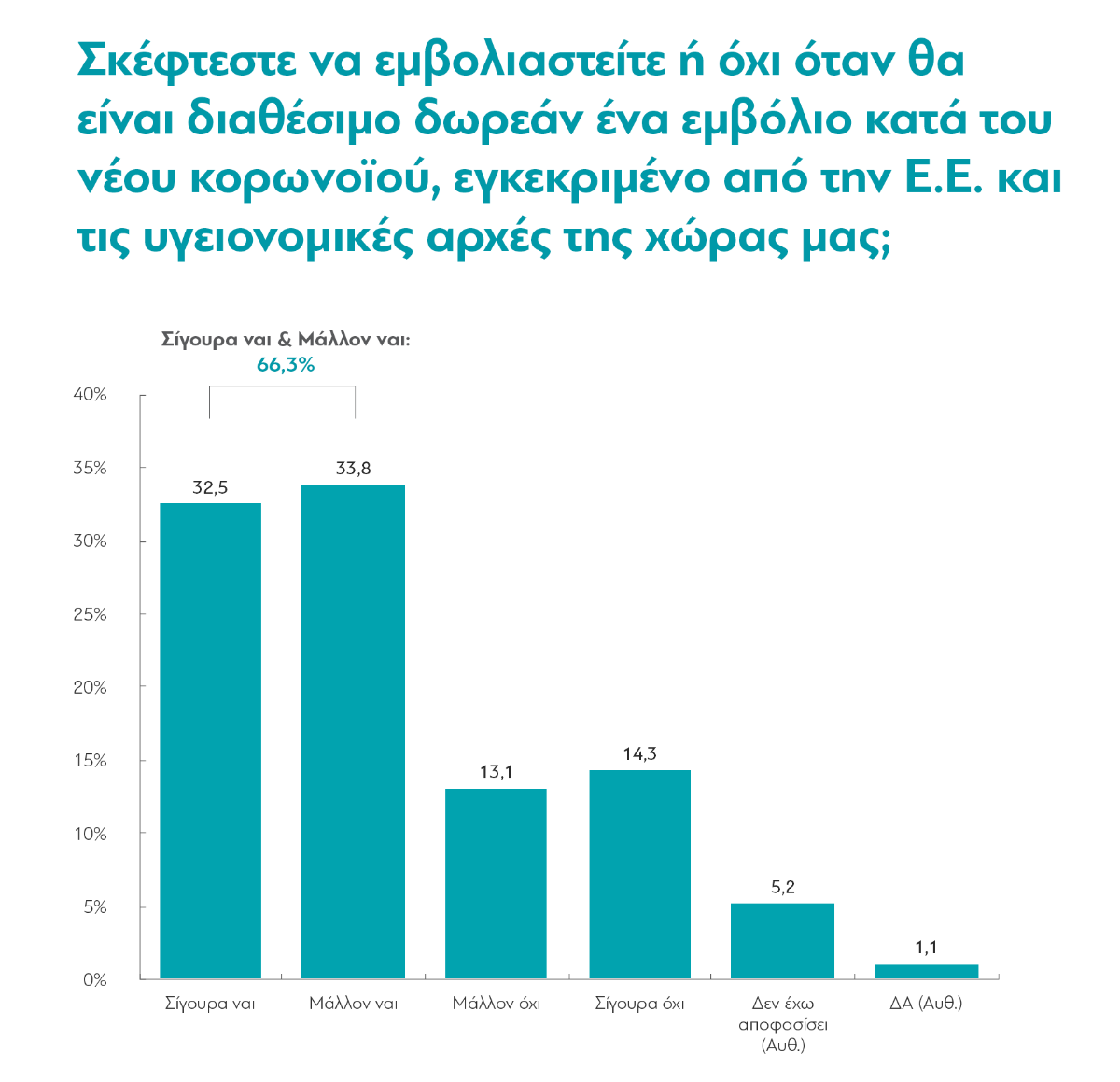
Οι απαντήσεις των ερωτηθέντων διαφέρουν, βεβαίως, στις διάφορες ομάδες του πληθυσμού. Τα ποσοστά αυτών που προτίθενται να κάνουν το εμβόλιο είναι μεγαλύτερα στους πιο ευκατάστατους, καθώς και σε όσους δηλώνουν ότι πάσχουν από κάποιο υποκείμενο νόσημα, ενώ πολύ σημαντικός παράγοντας είναι και η ηλικία: Στους ηλικίας άνω των 65, το ποσοστό αυτών που προτίθενται να κάνουν το εμβόλιο φτάνει στο 80,4% -μάλιστα, αυτοί που απαντούν “σίγουρα ναι” είναι το 55%.
Πώς άλλαξε τόσο γρήγορα η άποψη ενός μεγάλου μέρους του πληθυσμού; Αφενός, η έρευνα του Δεκεμβρίου έλαβε χώρα σε ένα διάστημα όπου στην Ελλάδα είχαμε σταθερά χιλιάδες κρούσματα, περίπου 600 Έλληνες στις ΜΕΘ και περίπου 100 νεκρούς από Covid-19 κάθε ημέρα, οπότε ο υγειονομικός κίνδυνος ήταν πολύ πιο έντονος και προφανής. Το σημαντικότερο όμως είναι το ότι στις αρχές Νοεμβρίου μεγάλες φαρμακευτικές εταιρείες ανακοίνωσαν ότι τα εμβόλια που αναπτύσσουν ολοκλήρωσαν με επιτυχία την 3η φάση δοκιμών σε δεκάδες χιλιάδες εθελοντές, με αποτελέσματα, μάλιστα, πολύ καλύτερα του αναμενομένου.
Εξάλλου, όπως φαίνεται από τα αποτελέσματα και του Σεπτεμβρίου, και επιβεβαιώνεται και τώρα, στην Ελλάδα δεν φαίνεται να υπάρχει ισχυρό κίνημα αντιεμβολιαστών ή αρνητών του ιού. Η συντριπτική πλειοψηφία των Ελλήνων έχει πολύ θετικές απόψεις για τα εμβόλια γενικότερα. Στην ερώτηση “συμφωνείτε ή διαφωνείτε με την άποψη ότι τα εμβόλια σώζουν ζωές” το 94% των ερωτηθέντων συμφωνεί. Μάλιστα, το 61% συμφωνούν “απολύτως”.
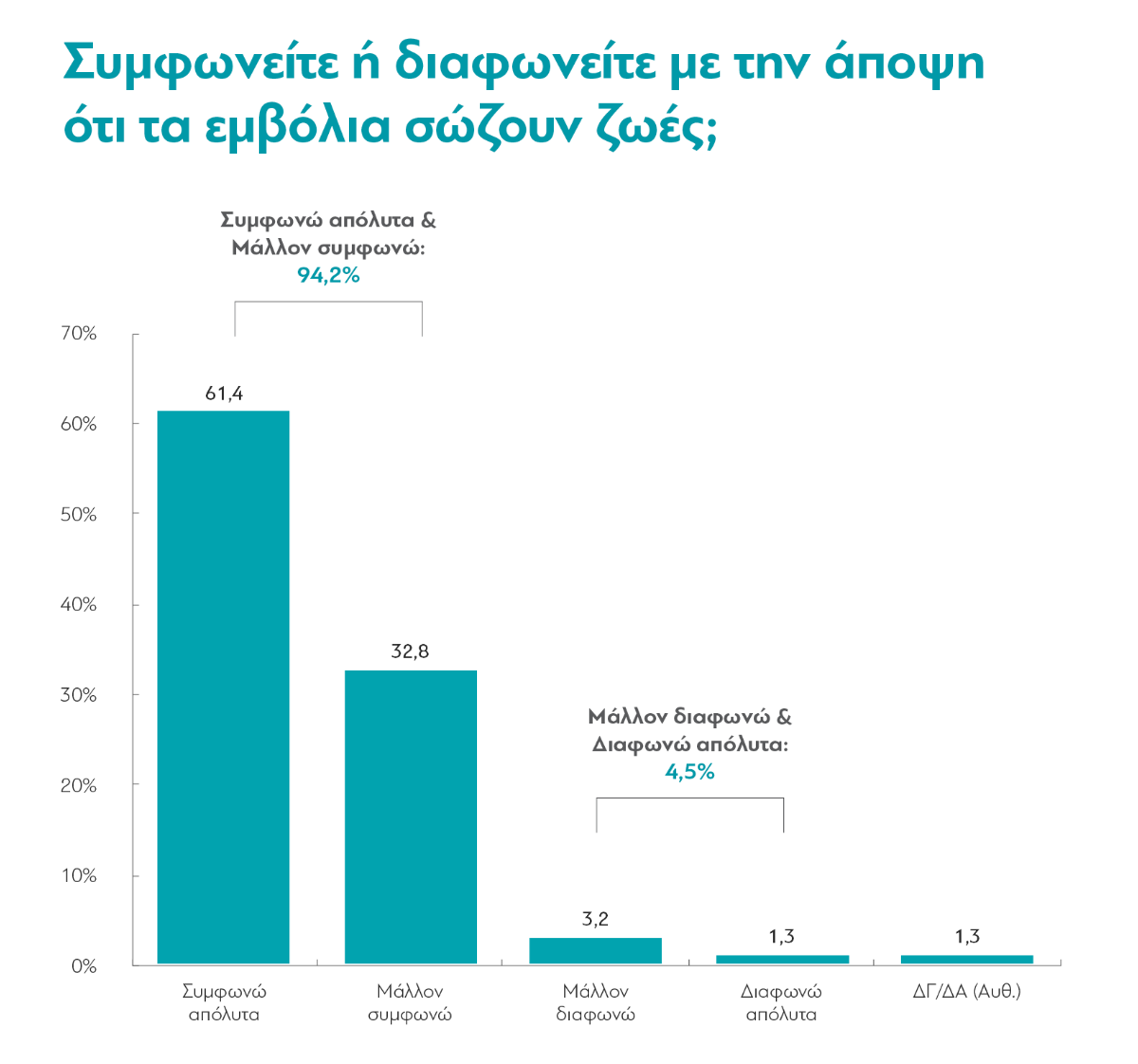
Από το περίπου 27% που δηλώνουν ότι (σίγουρα ή μάλλον) δεν θα κάνουν το εμβόλιο, η κυριότερη αιτία που αναφέρουν με πολύ μεγάλη διαφορά είναι το ότι “μπορεί να μην είναι ασφαλές, ή μπορεί να έχει παρενέργειες”. Τα ποσοστά των πολιτών που δηλώνουν ότι “δεν υπάρχει ο ιός” ή “δεν εμπιστεύομαι τα εμβόλια” σε αυτή την ερώτηση είναι πάρα πολύ χαμηλά. Όπως επισημαίνει ο διευθύνων σύμβουλος της Metron Analysis Στράτος Φαναράς, “ελάχιστοι είναι εκείνοι που αμφισβητούν επί της ουσίας την προσφορά των εμβολίων στη δημόσια υγεία και το λεγόμενο «αντιεμβολιαστικό κίνημα» είναι περιορισμένο με επιδημιολογικούς όρους. Αλλά αν η ενημέρωση των πολιτών δεν είναι ειλικρινής, διαφανής και κατανοητή, μπορεί να σπεκουλάρει στην άγνοια και να καταστεί υπολογίσιμη δύναμη”.
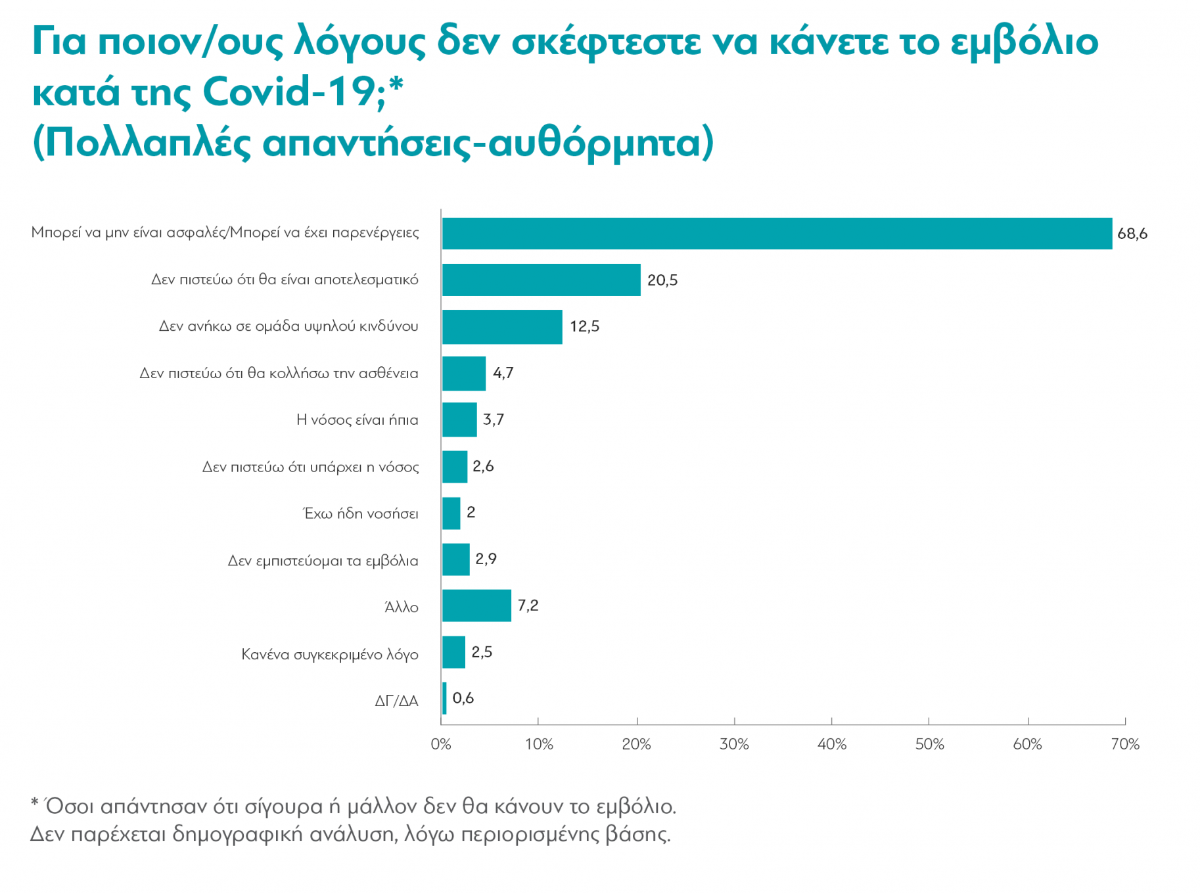
Πάντως, είναι γεγονός ότι, αν και πολλοί Έλληνες έχουν ήδη λάβει την απόφαση να κάνουν το εμβόλιο -ένας στους τέσσερις από όσους θα έκαναν (μάλλον ή σίγουρα) το εμβόλιο δηλώνουν ότι θα το έκαναν “από τους πρώτους”- μεγάλο ποσοστό των πολιτών έχουν ακόμα επιφυλάξεις και δισταγμούς. Περίπου οι μισοί από όσους δηλώνουν ότι προτίθενται να κάνουν το εμβόλιο, θα ήθελαν πρώτα να το συζητήσουν περισσότερο με γιατρούς ή συγγενείς.
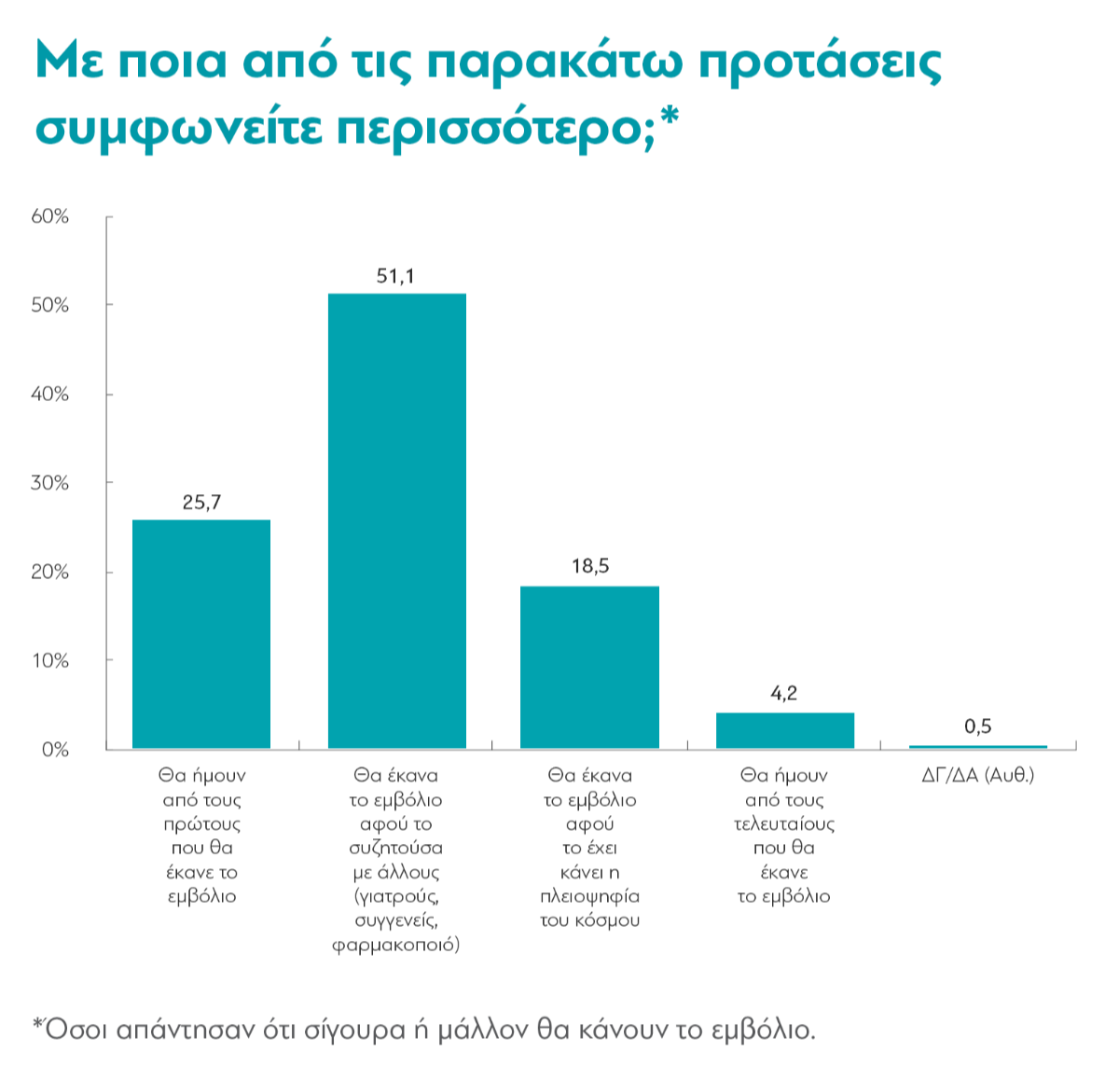
Κάτι εξαιρετικά ενδιαφέρον, επίσης, που είναι ενδεικτικό και του κλίματος στην κοινωνία: το 40,9% των ερωτηθέντων δηλώνουν ότι έχουν κάνει φέτος το εμβόλιο κατά της γρίπης, ένα ποσοστό πολύ υψηλότερο από το σύνηθες. Πράγματι, φέτος η ζήτηση για το εμβόλιο της γρίπης είναι πολύ μεγαλύτερη και ενδέχεται να φτάσει ως και 1 εκατ. περισσότερες δόσεις από ό,τι πέρυσι. Μάλιστα, 8 στους 10 ερωτηθέντες ηλικίας άνω των 65 δηλώνουν πως έχουν κάνει το εμβόλιο της γρίπης.
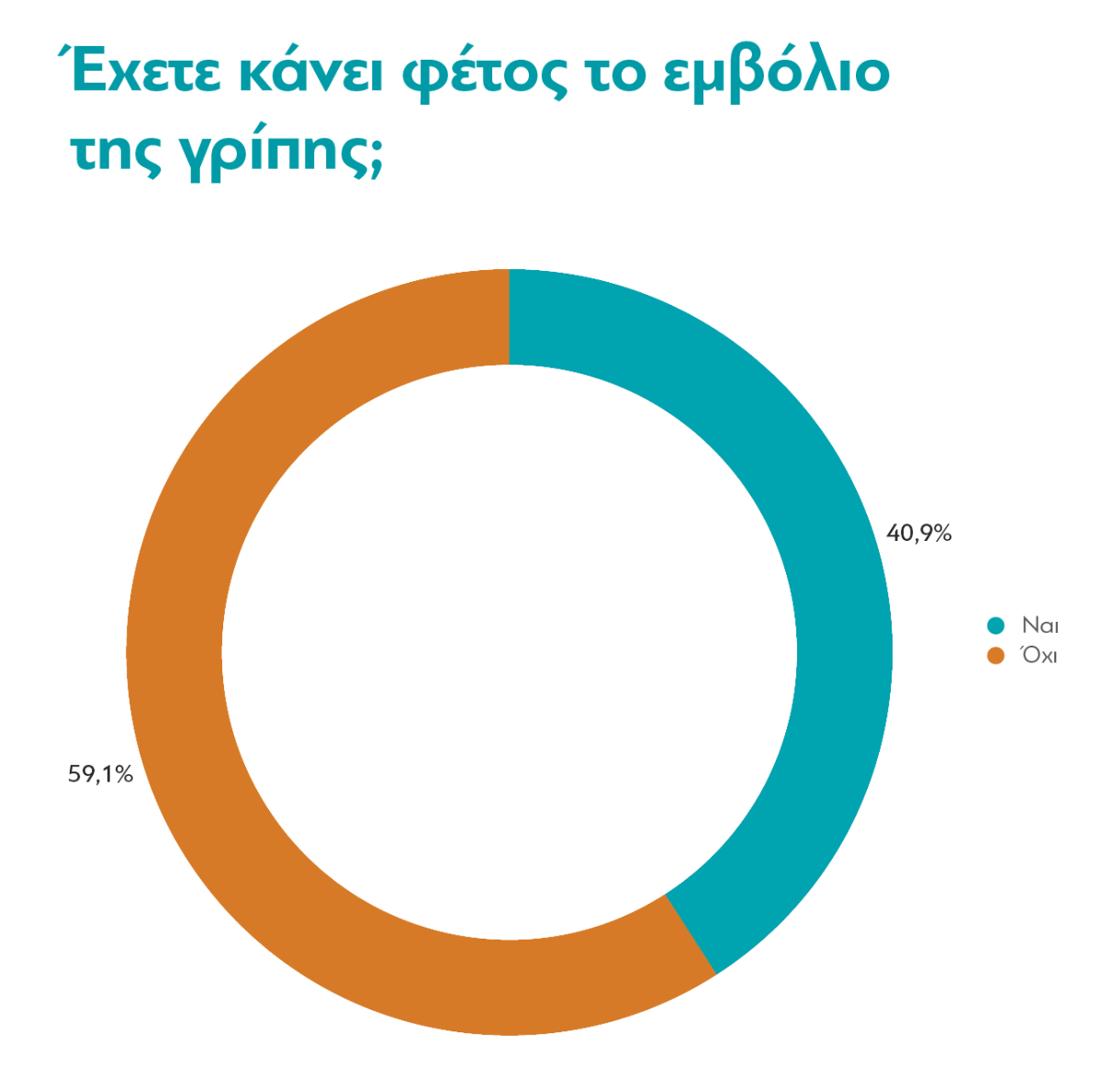
Όπως είναι αναμενόμενο, από όσους δηλώνουν ότι έχουν κάνει το εμβόλιο κατά της γρίπης, το 84,1% δηλώνουν ότι θα κάνουν και το εμβόλιο κατά του κορονοϊού.
Είναι, δε, αξιοσημείωτο ότι η πλειοψηφία των πολιτών πιστεύουν ότι το εμβόλιο θα είναι διαθέσιμο στη χώρα μας “το πρώτο τρίμηνο του 2021”.
Κατά τα άλλα, από ό,τι φαίνεται, ακόμα και μετά από δέκα μήνες πανδημίας και κρίσης, οι Έλληνες εξακολουθούν να πιστεύουν ότι γενικά στη χώρα μας “τα πράγματα πηγαίνουν προς τη σωστή κατεύθυνση”. Αν και το ποσοστό έχει υποχωρήσει αισθητά από το ιστορικά ανώτατο 86% του περασμένου Απριλίου, ωστόσο δεν έχει αλλάξει πολύ από του Σεπτεμβρίου (54% έναντι 57% τον Σεπτέμβριο). Όπως αναφέραμε και τον Σεπτέμβριο, έχει ενδιαφέρον το ότι αυτή η στάση είναι ασυνήθιστη. Η Metron Analysis κάνει αυτή την ερώτηση τακτικά, κάθε μήνα στις έρευνές της από το 2014 και με ελάχιστες εξαιρέσεις οι Έλληνες πάντα, παραδοσιακά θεωρούσαν ότι τα πράγματα δεν πηγαίνουν καλά. Καθ’ όλη τη διάρκεια της πανδημίας, ωστόσο, πλειοψηφικά ποσοστά θεωρούν ότι η χώρα μας πάει προς τη σωστή κατεύθυνση.
Εξάλλου, εν μέσω lockdown και της κορύφωσης του “δεύτερου κύματος”, το ποσοστό των Ελλήνων που πιστεύουν ότι “τα χειρότερα έχουν περάσει” αυξήθηκε σε 39%, έναντι 19% τον περασμένο Σεπτέμβριο. Η πλειοψηφία, ωστόσο (47%, από 73% το Σεπτέμβριο) εξακολουθούν να πιστεύουν ότι “έρχονται δυσκολότερες ημέρες”.
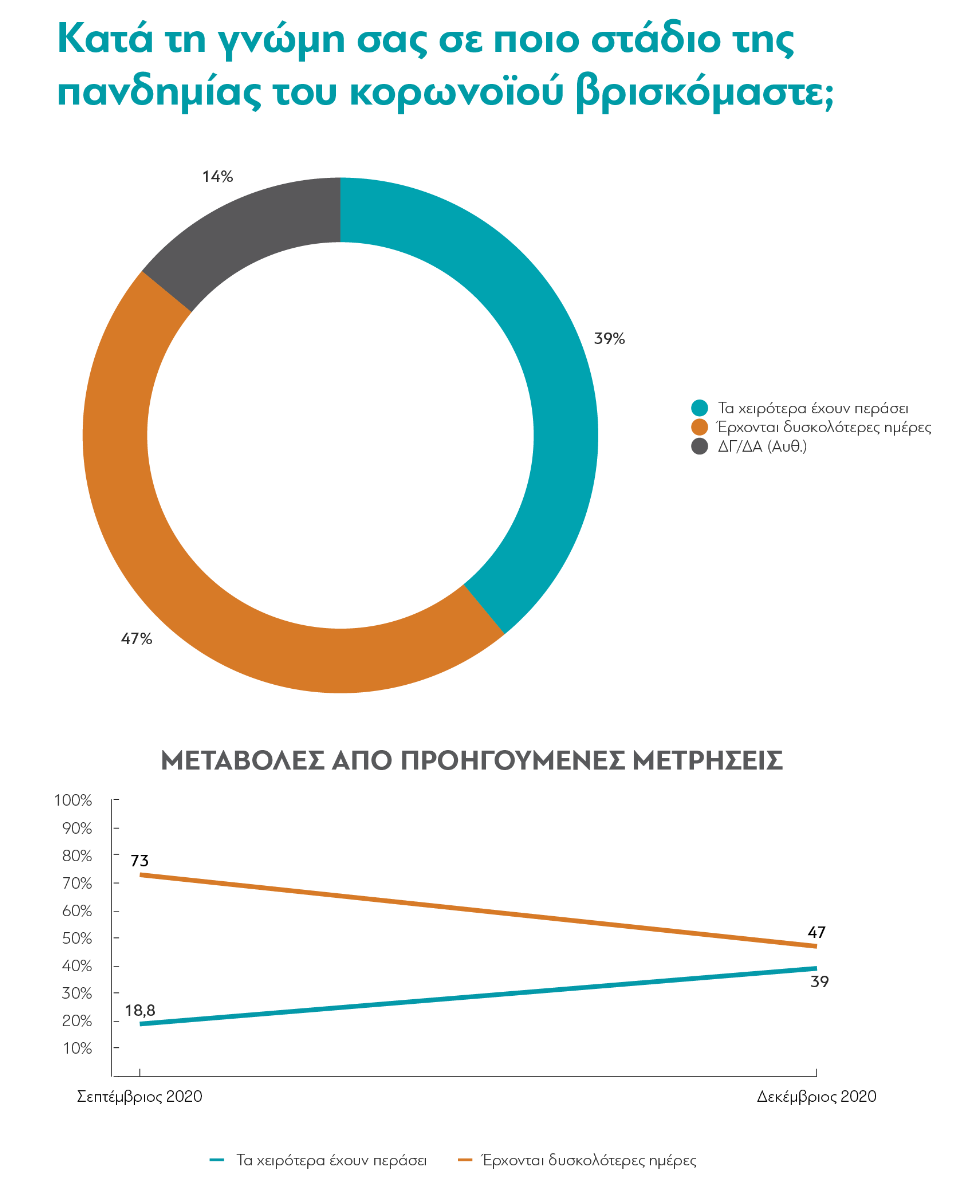
Και αυτή τη φορά επιβεβαιώνεται ότι η πανδημία έχει αλλάξει εντελώς τον τρόπο που ζούμε. Το 65,1% δηλώνουν ότι οι ζωές τους έχουν αλλάξει “πολύ” ή “πάρα πολύ” -και το ποσοστό φτάνει το 88% αν προσθέσουμε και το “αρκετά” (από 73% τον Σεπτέμβριο). Όλες οι ηλικίες, όλες οι κοινωνικές τάξεις και όλες οι κατηγορίες πληθυσμού συμφωνούν -με την εξαίρεση ενός αξιοσημείωτου 23,8% όσων δηλώνουν αγρότες, οι οποίοι απαντούν πως η ζωή τους στην πανδημία δεν έχει αλλάξει “καθόλου”.
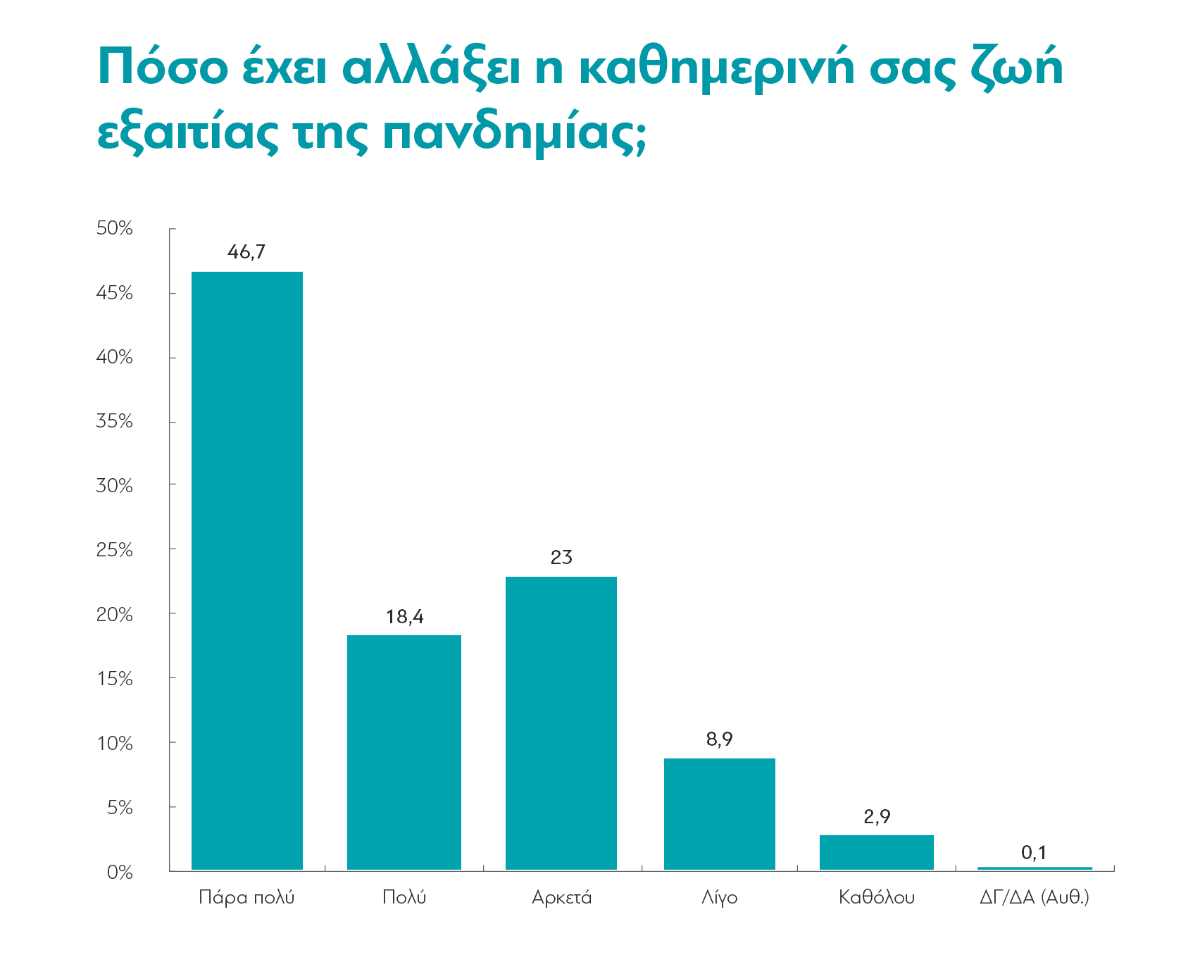
Επιπλέον, οι Έλληνες, όπως είναι φυσικό, εξακολουθούν να φοβούνται τον κορονοϊό. Ένα 54% απαντούν “πιθανό” ή “αρκετά πιθανό” στην ερώτηση αν θεωρούν ότι κινδυνεύουν να προσβληθούν, και 63% απαντούν “πολύ” ή “αρκετά” στο πόσο πιστεύουν ότι κινδυνεύουν από τη νόσο, αν προσβληθούν. Και εδώ οι απαντήσεις επηρεάζονται σημαντικά από την ηλικία των ερωτηθέντων.
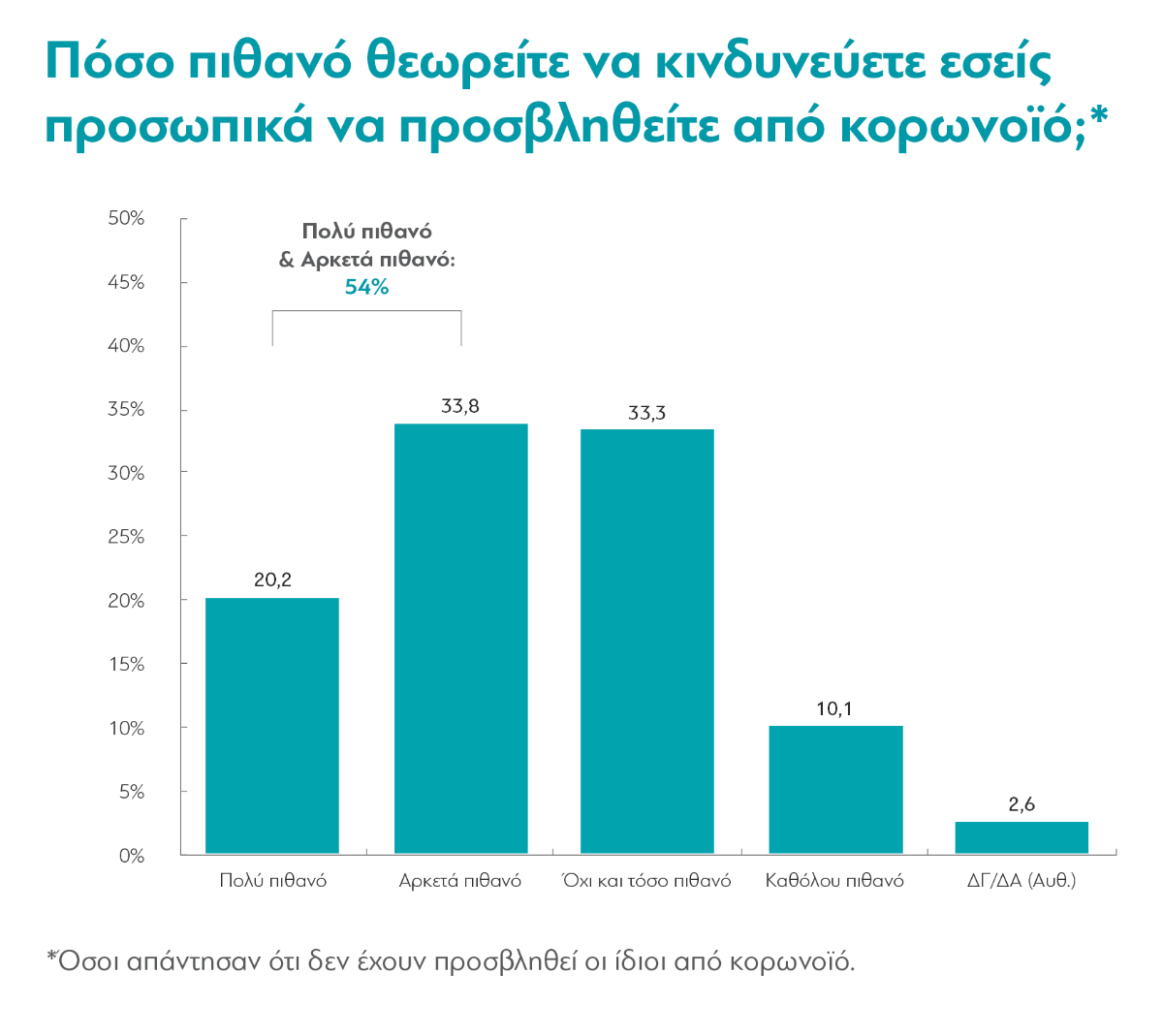
Εξάλλου, για πρώτη φορά από τον Απρίλιο, γίνεται στατιστικά σημαντικό το ποσοστό των ανθρώπων που απαντούν θετικά στην ερώτηση αν έχουν κολλήσει κορονοϊό. Περίπου 2,5% απαντούν “ναι” στη σχετική ερώτηση, ένα ποσοστό που αντιστοιχεί σε περίπου 200.000 ανθρώπους στο γενικό πληθυσμό, όχι πάρα πολύ μακριά από τον πραγματικό αριθμό επιβεβαιωμένων κρουσμάτων (πάνω από 130.000 την ώρα που γράφονται αυτές οι γραμμές).
Όσον αφορά το πότε υπολογίζουν ότι θα τελειώσει η πανδημία και θα επανέλθουμε σε μια φυσιολογική καθημερινότητα, οι απαντήσεις αποτυπώνουν μια συνειδητοποίηση και έναν ρεαλισμό. Θυμίζουμε ότι τον περασμένο Απρίλιο η πλειοψηφία των Ελλήνων (68%) πίστευαν ότι η κανονικότητα θα έχει επανέλθει μέχρι τον Σεπτέμβριο. Του 2020. Τον Σεπτέμβριο του 2020, όπως και σήμερα, οι απαντήσεις ήταν πολύ διαφορετικές. Πλέον το 68% των Ελλήνων πιστεύουν ότι θα επιστρέψουμε σε κανονικότητα μετά τα μέσα του 2021 -και ένας στους τρεις θεωρούν ότι θα επανέλθουμε κάποια στιγμή από το 2022 κι ύστερα.
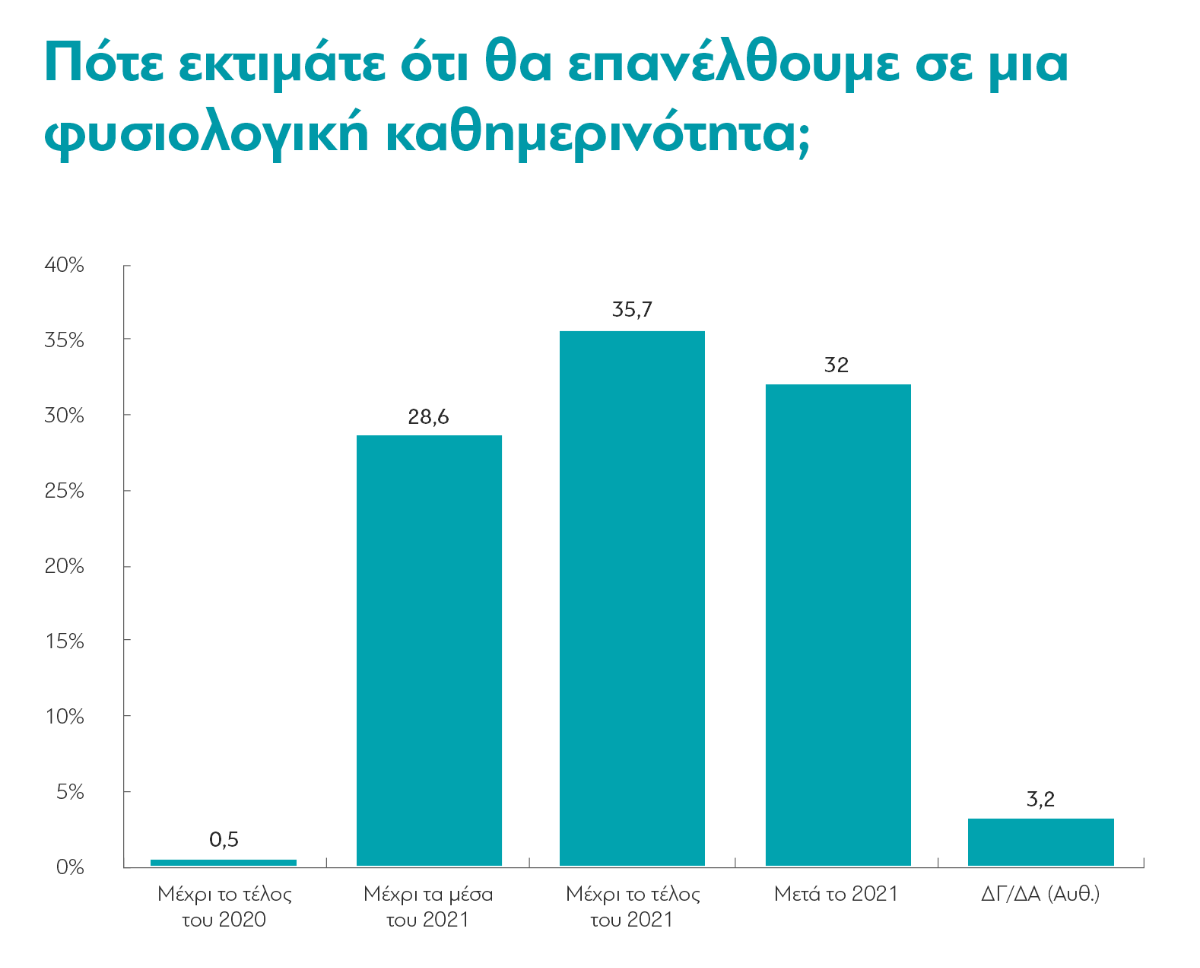
Σήμερα, εξάλλου, σχεδόν όλοι οι Έλληνες -92%- δηλώνουν ενημερωμένοι για την πανδημία, με το 49% να δηλώνουν “πολύ” ή “πάρα πολύ” ενημερωμένοι.
Η πλειοψηφία ενημερώνονται από το ίντερνετ (44%, όπως και τον Σεπτέμβριο) ενώ το ποσοστό αυτών που ενημερώνονται από την τηλεόραση έχει υποχωρήσει από το 49% τον Απρίλιο στο 37% σήμερα. Η τηλεόραση, πάντως, συγκεντρώνει και τον μικρότερο βαθμό εμπιστοσύνης από όλες τις πηγές ενημέρωσης, ενώ και το ίντερνετ παίρνει χαμηλό βαθμό. Οι πολίτες εμπιστεύονται, όμως, τους προσωπικούς γιατρούς και τους συγγενείς τους σε πολύ μεγαλύτερο βαθμό για την ενημέρωσή τους.
Τέλος, αξίζει να σημειώσουμε δύο άλλα ενδιαφέροντα ευρήματα.
Πρώτα από όλα, είναι σημαντικό το ότι 1 στους 3 Έλληνες δηλώνουν ότι πάσχουν από ένα διαγνωσμένο υποκείμενο νόσημα, με συχνότερα την υπέρταση (15,8%), τις χρόνιες μεταβολικές παθήσεις, όπως ο σακχαρώδης διαβήτης (9%) και τα χρόνια αναπνευστικά νοσήματα, όπως το άσθμα (5,8%). Όπως αναφέρθηκε παραπάνω, τα μέλη αυτής της πολύ μεγάλης ομάδας δηλώνουν σε ποσοστό μεγαλύτερο του γενικού πληθυσμού (72%) ότι προτίθενται να κάνουν και το εμβόλιο για τον κορονοϊό.
Ενδιαφέρον, επίσης, είναι το ότι πλέον οι μισοί εργαζόμενοι εργάζονται κανονικά στον χώρο εργασίας τους (48%) εν μέσω lockdown, και μόνο 20,3% δηλώνουν ότι εργάζονται με τηλεργασία. Τα αντίστοιχα ποσοστά τον Απρίλιο του 2020, στην πρώτη καραντίνα, ήταν αρκετά διαφορετικά. Τότε μόνο το 25,4% εργάζονταν στον χώρο εργασίας τους, και το 26,2% με τηλεργασία, ενώ σχεδόν οι μισοί εργαζόμενοι ήταν σε μειωμένο ωράριο, άδεια ή αναστολή εργασίας. Τώρα σε τέτοιες μορφές μειωμένης απασχόλησης (ή μη-απασχόλησης) βρίσκεται μόνο 1 στους 3 εργαζόμενους.







